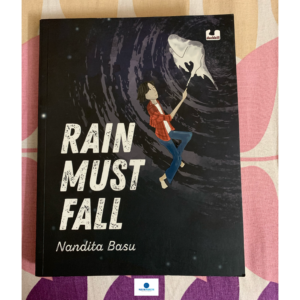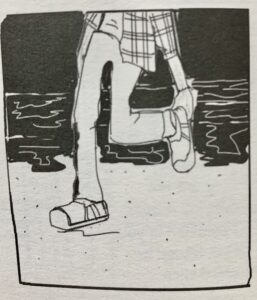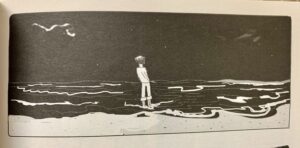Book Review: Rain Must Fall -Nandita Basu
Rain must Fall by Nandita Basu is a book I naturally gravitated to firstly because it was a Duckbill book. I have loved so many of their books and this one, with its cover and the blurb got me curious. Books tend to wrap me up in their story in a way that I end up dreaming about and holding close many things the characters go through. So, when I read on the blub that it was a “tale of love and loss, of rejection and affirmation, and above all, the healing and illuminating power of friendship.” I was nervous if it would make me cry endlessly (come on, some books do that). But I was also inquisitive because there was a ghost in the story!
It is interesting that the book blurb does not say anything about the fact that the main character of the book is queer! The moment however, that we are on page seven, Rumi clarifies to their dad, much to his chagrin, that they are non-binary. That did it for me. There was special love for the main character, they are NB. The story is layered and so lovely. One of the things that absolutely stop me in my tracks is the black and white graphics. You’ve got to marvel at how motion is shown, how so much emotion is shown in just black and white. Here take this in will you…
What really resonated for me in this book is this non-binary high school person’s journey of invisibility, erasure, and isolation. Their desire to be honest and be embraced for who they are and the affirmation they receive (for now, only) from another entity (Rain) who simply embraces them for who they are is remarkable to notice and learn from. As a non-binary person and someone who holds space for stories of other queer folks, I find the dark humor, the ease with intensity, and the complete self-acceptance that Rumi comes to hold, as something so many queer folks experience. Their friend, their ancestor, Rain telling them before they leave the earthy plane to “…not be anything but honest with yourself” is a powerful affirmation most queer folks yearn to have in their lives.
The story also invokes understandings of intergenerational trauma. The tendencies for family to disown or label someone who doesn’t fit, as the black sheep and the pain that it leads us into, generation after generation is one that is an undercurrent in the book. While Rumi’s parents seem to be capable enough to coparent after a divorce, they seem to grapple with being parents that are able to be led by their child’s needs. But eventually they are able to hold space for one another in ways that help Rumi love the things they have access to.
All in all, this is a sweet story of an NB person, finding their space in the world, holding on to hope in their body and keeping close people, things and practices that help them be unapologetically themselves.
Come check out the book at Pause Library at Pause for Perspective. We have an insanely affordable membership for the library and some amazing books to devour.
-Aarathi



